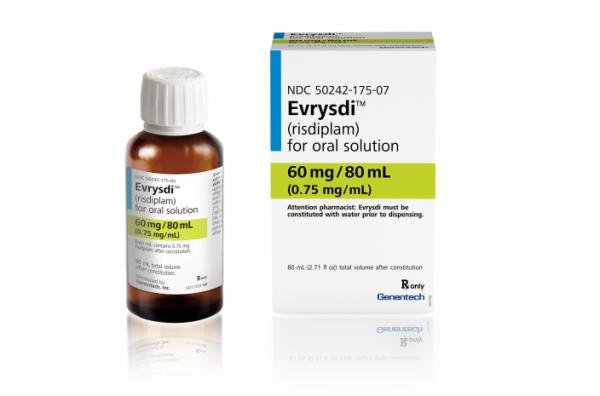Evrysdi Side Effects
Generic name: risdiplam
Medically reviewed by Drugs.com. Last updated on Jul 6, 2023.
Note: This document contains side effect information about risdiplam. Some dosage forms listed on this page may not apply to the brand name Evrysdi.
Applies to risdiplam: oral powder for solution.
Serious side effects of Evrysdi
Along with its needed effects, risdiplam (the active ingredient contained in Evrysdi) may cause some unwanted effects. Although not all of these side effects may occur, if they do occur they may need medical attention.
Check with your doctor immediately if any of the following side effects occur while taking risdiplam:
More common
- Body aches or pain
- chest pain or tightness
- chills
- cough
- ear congestion
- fever
- headache
- loss of voice
- runny or stuffy nose
- sneezing
- sore throat
- trouble breathing
- unusual tiredness or weakness
Less common
- Bladder pain
- bloody or cloudy urine
- difficult, burning, or painful urination
- frequent urge to urinate
- lower back or side pain
Other side effects of Evrysdi
Some side effects of risdiplam may occur that usually do not need medical attention. These side effects may go away during treatment as your body adjusts to the medicine. Also, your health care professional may be able to tell you about ways to prevent or reduce some of these side effects.
Check with your health care professional if any of the following side effects continue or are bothersome or if you have any questions about them:
More common
- Canker sores
- constipation
- diarrhea
- skin rash
- sores, ulcers, or white spots on the lips or tongue or inside the mouth
- vomiting
Less common
- Difficulty in moving
- joint pain
- muscle pain or stiffness
For Healthcare Professionals
Applies to risdiplam: oral powder for reconstitution.
General
The most frequently reported side effects included fever, diarrhea, headache, and rash. Additionally, among patients with infantile-onset spinal muscular atrophy, upper respiratory tract infection, lower respiratory tract infection, constipation, vomiting, and cough were reported.[Ref]
Dermatologic
Very common (10% or more): Rash (up to 17%)
Common (1% to 10%): Eczema
Postmarketing reports: Cutaneous vasculitis
Rash included dermatitis, rash, erythema, maculo-papular rash, erythematous rash, popular rash, allergic dermatitis, acneiform dermatitis, and folliculitis.
Cutaneous vasculitis was identified during post-marketing experience.
Endocrine
Common (1% to 10%): Cryptorchism
Gastrointestinal
Very common (10% or more): Constipation (up to 25%), diarrhea (up to 17%), vomiting (up to 17%)
Common (1% to 10%): Mouth and aphthous ulcers, gastroesophageal reflux disease, gastroenteritis, nausea, upper abdominal pain
Genitourinary
Common (1% to 10%): Urinary tract infection
Urinary tract infection included urinary tract infection and cystitis.
Musculoskeletal
Common (1% to 10%): Arthralgia, joint dislocation
Nervous system
Very common (10% or more): Headache (20%)
Other
Pyrexia included fever and hyperpyrexia.
Very common (10% or more): Pyrexia (up to 54%), teething (up to 13%)
Common (1% to 10%): Ear infection
Respiratory
Upper respiratory tract infections included nasopharyngitis, respiratory tract infection, rhinitis, influenza, pharyngitis, viral respiratory tract infection, upper respiratory tract infection (bacterial and viral), and COVID-19.
Lower respiratory tract infection included pneumonia and bronchitis.
Very common (10% or more): Upper respiratory tract infection (up to 82%), pneumonia (up to 40%), cough (12.9%), bronchitis (up to 11%)
Common (1% to 10%): Respiratory failure, respiratory distress, acute respiratory failure, atelectasis
Frequency not reported: Lower respiratory tract infection
Frequently asked questions
- Evrysdi vs Spinraza: How do they compare?
- How does it work for SMA?
- How effective is it?
- Does it cure spinal muscular atrophy (SMA)?
- How is it administered?
More about Evrysdi (risdiplam)
- Check interactions
- Compare alternatives
- Pricing & coupons
- Drug images
- Dosage information
- During pregnancy
- FDA approval history
- Drug class: miscellaneous uncategorized agents
- En español
Patient resources
Professional resources
Related treatment guides
References
1. Product Information. Evrysdi (risdiplam). Genentech. 2020.
2. Product Information. Evrysdi (risdiplam). Genentech. 2024.
3. Product Information. Evrysdi (risdiplam). Roche Products Pty Ltd. 2023.
4. Product Information. Evrysdi (risdiplam). Roche Products Ltd. 2023.
Further information
Always consult your healthcare provider to ensure the information displayed on this page applies to your personal circumstances.
Some side effects may not be reported. You may report them to the FDA.

